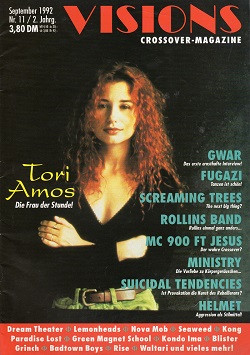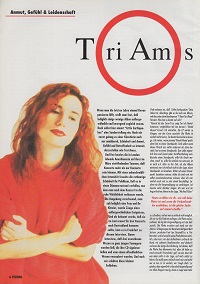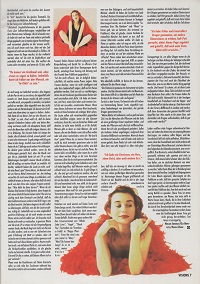|

songs | interviews | photos | tours | boots | press releases | timeline
Visions (Germany)
September 1992

Tori Amos
Grace, Feeling and Passion
If you review the last years, you will realize that only a few albums were extraordinary and moving at the same time. But even here Little Earthquakes takes a special position. Never before has an artist managed to present beauty and grace, feeling and dismay nearly as intensely as Tori Amos. And live, the American woman living in London has proved in her March tour that concerts can be more than just concerts. With an incredible intensity the red-haired beauty captivated her audience, let them fall into a doze wherefrom you were released after the concert - into the raw reality. The environment disappeared, you only saw a woman and her piano, you witnessed an extraordinary event. And after the announcement was made that she would come back to Germany for three concerts in June, this interview took place in Frankfurt. An interview that turned three adults into very young teenagers who let their CD be signed and who were enchanted by an elve-like being. And we experienced those little earthquakes, too.
Many people assumed that Little Earthquakes is your debut, but there is another album, published under the band name Y Kant Tori Read. What about that?
"Do you know the cover? (it shows Tori as a metal amazon, comparable to Lee Aaron's "Metal Queen" cover) I wish that the LP would sound the way the cover looks. The record is just not heavy. It doesn't have a clear statement. I mean, when someone plays Thrash Metal, then that has a point of view. And even if this thrash consists of nothing but noise, that has a point of view. That should be the point of every publication. Take a clear position, if you want to make noise, do it, if you only want to be cute, that's also o.k. But at the time the album was created, I was not able to take a clear position. If I had to take a position, I would have had to have it out with myself, but I was much too busy to suppress things like the rape. I could not sing about it. Only in August last year I was able to write 'Me and a Gun,' before it was simply impossible. When we started to record the album five years ago, the rape only happened one year before. The record was published and died four years ago. By the way, the drummer of the band was Matt Sorum, Joe Chiccarelli (among others Pat Benatar) and I really liked his productions, but just before the recordings the band split up, we took studio musicians and so the songs lost their direction. I believe that the record has its moments, but I tried too much to be everybody's girl, because I was not able to listen to myself. You just have to be strong and not only pretending. It is simple to play a tough chick, but it is really boring and, above all, it is sad, because it shows a deep uncertainity, and when you are uncertain, you can not be strong."
In "Girl" you use the same subject. You sing about a girl that wants to please everyone. Is the song an experience you had yourself?
(Smiling) "Unfortunately the whole record is about self-experiences, comparable to the shedding of a snake. When I was thirteen, I believed in fairies and other spiritual things, was sunk in my own world of imagination, believed in the unseen world, what I still do today. But over the time I started to feel like a nitwit. I mean, when you smoke dope, it might be normal, but like this? You sit in your English lesson and you are talking to a fairy. The people did not want to understand that, and when you are 13, you don't want to be faced with a pityful smile all the time. So I began to destroy the part in me that is actually creative. Instead, I became very cynical, disguised myself to become popular, to be loved by everyone. But actually that was nothing else than a game of hide-and-seek. You can be a bigmouth without having anything to say. At that time, I definitely only had the wish to be an in-chick. Today I know that you should have your own thoughts and that you have to stick to your point of view. Today I accept that not all people like me, that's all right. Just before I listened again to some of the songs I wrote at that time, and it was very interesting. There were some really good ideas in the song, not in the lyrics, after all, aged 15, I had rather different ideas. You are thinking in a different way when you made the experience, but the music was good. Well, with 19 I certainly had experienced so many rejections with respect to my music that I began to doubt my music. I thought, perhaps the people are right, look for a band for you, play dance music, at the moment we are interested in heavy metal and so on. In the beginning I tried to discover new things, and perhaps to learn something, but then I let myself be infected with the virus of the everlasting questions: 'What do you think of that?' When you always had success as a small child, you wonder why today no one is clapping any longer. You become so addicted to the noise of applause that you lose your self-confidence and wonder what you have done wrong. And then you begin to convince yourself that what the people tell you is right. Certainly it was an incredible positive experience when I sat down again at the piano and was myself. I do not need to sell myself, in a certain way the first LP was something like the rape of my soul, the music lays more closely to my heart than anything else, and it surely was a good experience to play with Matt. But I wish I would have been stronger then and had not listened to those idiots. One day they tell you how wonderful your record is, and when the sales figures failed to materialize, the same thing suddenly is shit. It is quite shocking for them to see that this album sells so well."
If you look at the reactions to your concerts, many of your spectators are so deep in thought, others (often women) find your appearance too offensive because of your posture and gestures (Tori Amos supports every move with gestures, puts breathing under her singing and facing the audience frontally).
"I am not offensive, that's just passion. I want to show my power. Many women think that, when they are not intelligent or show their passion, they are considered to be bitches. And to justify themselves, they sit there, with dry, closed legs and condemn me for that. I have a concience, a heart, a spirit but also my sex. I am a sexual, emotional being. When you describe that appearance with one word, I would consider confrontation the right word. The people should be responsible to their feelings when they leave the concert, because what they feel and think afterwards, is not my feeling, it is their feeling. Why are there so many men who hate me, who want to rip off my clothes or who jerk off when I play 'Me And A Gun'? When you come to my show, you either have to ignore me or have to look into yourself, here is nothing that can distract you, there's only me and the piano. You can close up yourself, but when you don't do that, then things will show up in you which you are reluctant to think about. These do not really have to be good thoughts, but I have understood that monsters are neither good nor bad, they are just there. There are things in you which are good and there are other things which are bad. Sometimes you are cruel, sometimes you are the victim, sometimes you are passionated and sometimes not, what counts is the whole being! Some things you simply can not exclude. You have to show responsibility for your whole being. Try to learn as much as possible about yourself and show responsibility."
Let's come back to your lyrics and your songs. Many critics have compared you to Kate Bush, but when someone visits your shows or studies your lyrics more closely, he finds completely different heroes. Cover versions of "Whole Lotta Love," "Angie," "Thank You," lyric lines like "Strawberry Fields" in "Happy Phantom," "Even the wind cries your name" in "Mary."
"What? You know the song? Yes, it is true, my heroes come out of the seventies and are mainly men, though I rather [like] the things of Judy Garland, Barbara Streisand and Joni Mitchell (which you could convince yourself of at the last concert in Stuttgart, where you could hear "Somewhere Over the Rainbow" and "Moon" as the last encore, and, as she stresses, the first time in front of an audience). But I believe that my preference of male musicians has to do something with the fact that I always wanted to play the guitar. I love to play the piano, but I do not like it, because all people are thinking that a piano has a certain sound. I want to change this idea, so on the next record we will use an effected piano side by side with the acoustic one, so that we will be able to play riffs and to connect the piano to a Marshall Amp. I want to develop myself. (And with a laugh). On the next tour I will have two pianos and roll to and fro with the piano chair."
What also stands out is your way to breathe while singing the words.
"The voice is an instrument like every other one. The breathing takes very much room. The breathing helps you to survive and I find the sound of breathing very exciting."
Back to your lyrics. You often use colours to accompany your lyrics, actually typical thoughts of someone who has just taken drugs.
"My mother is an Indian, and once there was a time when mankind did respect the plants and the earth as a great vision, and when they neither abused the plants nor the earth. Today that has changed substantially. Even the Indians have started to make abuse due to their situation. If you visit a reservation today, and I have lived in one for many years, you will find many alcoholics there, what is very tragical. But many think, that this is an escape, but it makes them unable to think. It is bad to see what became of many great people. Today drugs mostly serve as an escape from reality and you are able to experience other levels of consciousness and to reach other dimensions. I took drugs in a controlled way in the past to reach other dimensions, smoked pot while listening to Jimmy Page and hoped that my father wouldn't catch me, but I think that this is a part of your teenage days, especially when you lived in the Sixties and the beginning of the Seventies. That was a completely different time, the revolution of many young people against the bourgeoise normal. An outbreak from the aims that once were given by the parents. They try to change something. Aims like humanity, the emancipation of the woman and also the equality of men, like it was shaped by Martin Luther King. And today? It seems as if these people have given up, these aims are just caricatures of themselves. The women have not reached their aim, humanity is a foreign word in today's society and hate for blacks and foreigners is stronger than ever. And then you see the abuse of extasy in London and recognize that this generation has not grasped the whole conflict. What sense does it make to load yourself with drugs so much that you are not noticing anything anymore?"
Unfortunately many questions had to be left unanswered, we had overrun the interview by twenty minutes, another one should follow, and the soundcheck could not be held up. Fortunately, because the soundcheck was nothing else than a 45 minute request concert, and what happened on the following three evenings was unforgettable. Three concerts, different in the choice of songs, partially very spontaneous and always so intensive that cold showers run over your back to be captured in the next moment by an undescribabal warmth. Even at the open air in Hamburg this intensity came over. Merely acting as a supporting programme for Luka Bloom, she convinced the audience so much that the whole schedule was turned completely upside down, she unrestrained had to play further encores and finally Luka Bloom visibly despaired had to ask the audience to applaud to him at least a little bit. This woman is something very special, a being you can't capture in words, music that simply is not graspable in it's beauty anymore. In a world of music that has lost a lot of it's original fascination due to it's predictability, you cannot stress the greatness of this woman enough. Tori Amos is unique.
HOLGER ANDRAE / OLE BERGFLETH / KARLO RADIC
[translated by Ulrich Grepel]
original article
 
[scans by Sakre Heinze]
t o r i p h o r i a
tori amos digital archive
yessaid.com
|